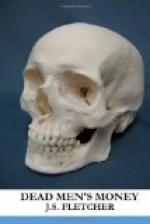“Now, doctor,” he said, “look at that—which is one of the latest forms of the ice-ax. Could that wound have been caused by that—or something very similar to it?”
The witness put a forefinger on the sharp point of the head.
“Certainly!” he answered. “It is much more likely to have been caused by such an implement as this than by a salmon gaff.”
Mr. Lindsey reached out his hand for the ice-ax, and, repossessing himself of it, passed it and its brown-paper wrapping to me.
“Thank you, doctor,” he said; “that’s all I wanted to know.” He turned to the bench. “I wish to ask your worships, if it is your intention, on the evidence you have heard, to commit the prisoner on the capital charge today?” he asked. “If it is, I shall oppose such a course. What I do ask, knowing what I do, is that you should adjourn this case for a week—when I shall have some evidence to put before you which, I think, will prove that this man did not kill Abel Crone.”
There was some discussion. I paid little attention to it, being considerably amazed at the sudden turn which things had taken, and astonished altogether by Mr. Lindsey’s production of the ice-ax. But the discussion ended in Mr. Lindsey having his own way, and Carter was remanded in custody, to be brought up again a week later; and presently we were all out in the streets, in groups, everybody talking excitedly about what had just taken place, and speculating on what it was that Lawyer Lindsey was after. Mr. Lindsey himself, however, was more imperturbable and, if anything, cooler than usual. He tapped me on the arm as we went out of court, and at the same time took the parcel containing the ice-ax from me.
“Hugh,” he said; “there’s nothing more to do today, and I’m going out of town at once, until tomorrow. You can lock up the office now, and you and the other two can take a holiday. I’m going straight home and then to the station.”
He turned hurriedly away in the direction of his house, and I went off to the office to carry out his instructions. There was nothing strange in his giving us a holiday—it was a thing he often did in summer, on fine days when we had nothing much to do, and this was a gloriously fine day and the proceedings in court had been so short that it was not yet noon. So I packed off the two junior clerks and the office lad, and locked up, and went away myself—and in the street outside I met Sir Gilbert Carstairs. He was coming along in our direction, evidently deep in thought, and he started a little as he looked up and saw me.
“Hullo, Moneylaws!” he said in his off-hand fashion. “I was just wanting to see you. I say!” he went on, laying a hand on my arm, “you’re dead certain that you’ve never mentioned to a soul but myself anything about that affair of yours and Crone’s—you know what I mean?”
“Absolutely certain, Sir Gilbert!” I answered. “There’s no living being knows—but yourself.”




